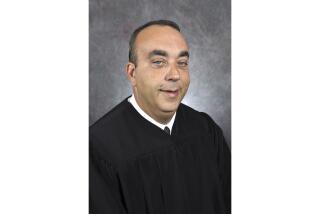LOOSENING OF STEM CELL LIMITS BACKED
In a high-profile dissent from Bush administration policy, the nation’s top medical research official told senators Monday that he backs an end to restrictions on federal funding for embryonic stem cell research.
“From my standpoint, it is clear today that American science will be better-served, and the nation will be better-served, if we let our scientists have access to more stem cell lines,” Dr. Elias A. Zerhouni, director of the National Institutes of Health, told the Senate health appropriations subcommittee, which oversees the agency’s nearly $29-billion budget.
“We cannot, I would think, be second-best in this area,” Zerhouni said. “I think it is important for us not to fight with one hand tied behind our back here, and NIH is key to that.”
Although Zerhouni had been seen as a tacit supporter of embryonic stem cell research, his unequivocal public endorsement came as a surprise. His comments in response to questions from Sen. Tom Harkin (D-Iowa), the subcommittee chairman, energized backers of stem cell research, who have been waging an uphill struggle on the only issue to draw a veto from President Bush during his six years in office.
“I think it will certainly mobilize opinion up on [Capitol] Hill,” said Jerome Zack, an embryonic stem cell researcher at the David Geffen School of Medicine at UCLA. With stem cell legislation moving again, Zack said, he was anticipating another Bush veto. But he hoped that it could be overridden.
“Convincing a handful of [lawmakers] of the opposing viewpoint could really sway things,” he said.
Because they can be grown into any type of cell in the body, embryonic stem cells are seen by many scientists as holding the key to a new era of regenerative medicine. Some scientists believe that their use could eventually result in cures for Parkinson’s disease, diabetes and other intractable ailments.
But producing embryonic stem cells involves the destruction of human embryos -- raising moral issues that some find profoundly disturbing.
In what was seen as a compromise attempt, Bush in 2001 limited federal funding for embryonic stem cell research to cell lines already in existence. About 20 of those lines are still in use. But they have become genetically degraded and are now ill-suited for research, said Zerhouni, who became NIH director in May 2002.
Last year, Bush vetoed legislation that would have allowed federal funding for research on new stem cell lines derived from embryos that would have otherwise been discarded by fertility clinics.
The Democratic-controlled House passed similar legislation again this year, and the Senate is expected to follow. “My hope is that the White House gets the message and doesn’t continue to stand in the way of progress,” Harkin said.
But White House spokesman Tony Fratto said the president’s role in the debate is different from that of Zerhouni, a scientist who serves as an advocate for research.
“The president has to balance the moral and scientific considerations of this nation,” Fratto said.
While Zerhouni is free to express his personal opinion, it is Bush who sets policy, the spokesman added.
“After careful and thoughtful deliberation with government and outside experts, there was only one moral line that the president said he would not cross -- and that is that federal taxpayer dollars should not be used in the destruction of embryos,” Fratto said.
Some religious conservatives criticized Zerhouni for his statements Monday. “He’s basically showing his true colors as an advocate and, sadly, that shows he’s not looking at the issue objectively,” said Wendy Wright, president of Concerned Women for America.
In particular, Wright said, Zerhouni is ignoring the promise of stem cells derived from sources other than human embryos, as well as the fruits of research from the established lines.
Scientists have been searching for alternatives -- such as stem cells from amniotic fluid, umbilical cord blood and adult organs -- that can also play a role in regenerative medicine. But most researchers agree that embryonic stem cells cannot be overlooked.
Studies claiming that adult stem cells have as much potential as embryonic stem cells “do not hold scientific water,” Zerhouni said Monday.
“I think they are overstated,” he said. “We do not know at this point where the breakthrough will come from.... All angles in stem cell research should be pursued.”
Several prominent researchers welcomed Zerhouni’s comments.
“When very prestigious physicians and scientists speak out, I think in the long run it will make a difference,” said Renee A. Reijo Pera, director of the human embryonic stem cell program at Stanford University.
Fred H. Gage, a stem cell researcher at the Salk Institute in La Jolla, said Zerhouni may have taken a political risk by articulating a position so clearly at odds with that of the White House.
“He’s very careful about what he says, and fairly conservative in his policy statements,” Gage said. “My guess is this was a very well-thought-out statement.
“If it does put him at risk, all the more reason to respect his judgment,” Gage added.
Harkin called Zerhouni’s comments “very profound and courageous.”
Several states, including California, are raising their own funds for stem cell research, but Zerhouni said NIH was better suited to conduct such long-term and difficult projects.
“There is no state that can really provide the depth and oversight and stimulation of this research over the long run,” he told the panel. “This is not a one-mile race. This may be a marathon.”
Reijo Pera said “it would be great” to have California’s $3-billion funding augmented by the federal government.
“We need to find a way to move forward,” Zerhouni said. “Obviously, it’s more than science that’s involved, but I hope that we can find that soon.”
*
ricardo.alonso-zaldivar@latimes.com
karen.kaplan@latimes.com
Alonso-Zaldivar reported from Washington and Kaplan from Los Angeles.
More to Read
Sign up for Essential California
The most important California stories and recommendations in your inbox every morning.
You may occasionally receive promotional content from the Los Angeles Times.











